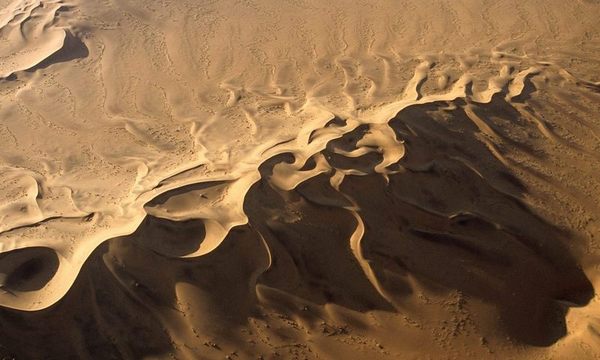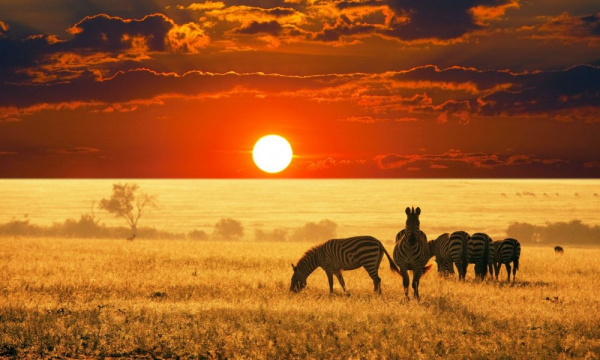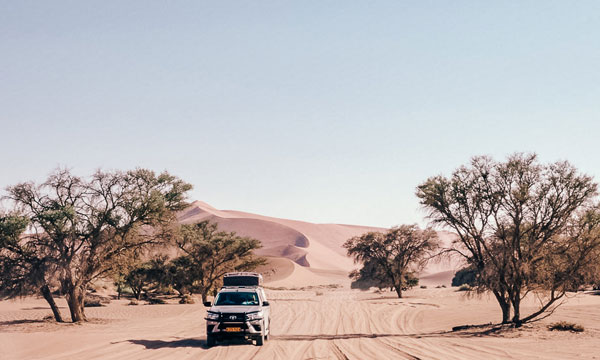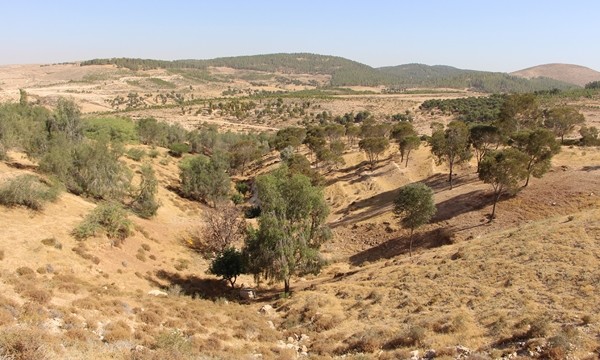Call Us
8:00am - 17:00PM
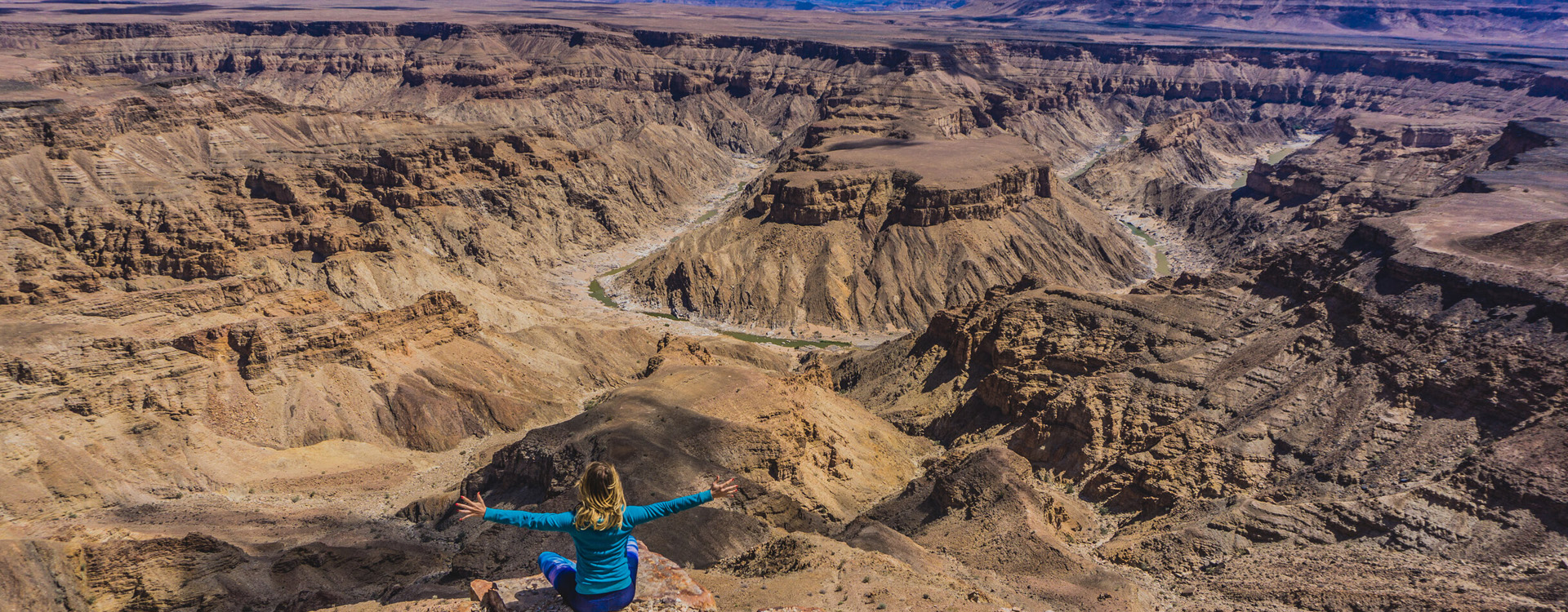
Fish River Canyon
About Fish River Canyon
Nestled in the heart of southern Namibia, Africa lies a natural wonder that will take your breath away: the Fish River Canyon. This majestic canyon boasts the title of the largest in Africa, stretching over 160 km long, up to 27 km wide, and up to 550 meters deep. The canyon's rugged terrain, carved by the Fish River over millions of years, offers panoramic views that will leave you speechless. And if you're looking for adventure in Namibia Safaris, the canyon also features challenging hiking trails and opportunities to spot unique wildlife. Don't miss the chance to experience this incredible natural wonder!
Prepare for an unforgettable Fish River Canyon Tours with essential planning insights. Let the grandeur of this geological wonder ignite your sense of wonder and leave an indelible mark on your soul.
Fish River Canyon Tours and Safaris
We Think You’ll Love
Best time to visit
The Best Time to Visit Fish River Canyon is during the cooler winter months, from May to September. This period offers the ideal climate for exploring Africa's largest canyon. The days are comfortably warm and nights cool off and require some warm clothing. This season is perfect for hikers wanting to experience the canyon's majestic landscapes up close. While summer, from October to April, might tempt with its rare rains, it turns the canyon exceedingly hot, making outdoor adventures less advisable.
Wildlife
Fish River Canyon is home to a quiet but fascinating Namibia Wildlife scene. You might spot mountain zebras, kudus, or even a rare leopard with some patience. Baboons are more visible, and small dassies often appear among the rocks. Bird lovers can enjoy rare sights of black eagles and about 60 other bird types, making every visit to the canyon uniquely rewarding.
What To Experience
We think you will love
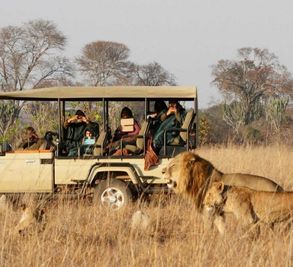
Game Drives
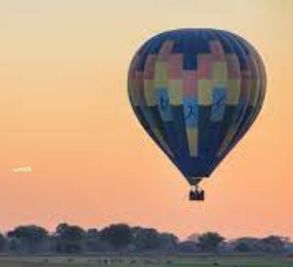
Ballon Safari
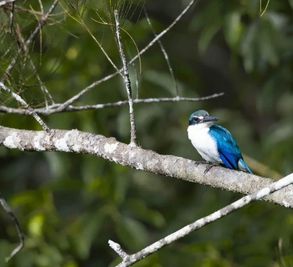
Birding
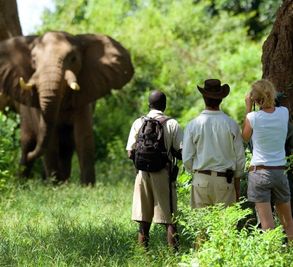
Walking Safari
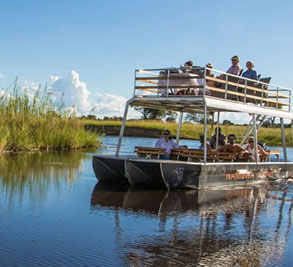
Boating Safari
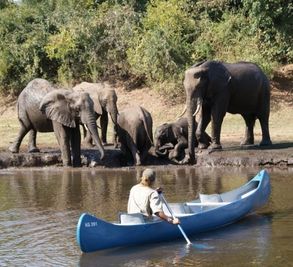
Canoeing
Fish River Canyon Travel Guide
We Think You’ll Love
Quick Facts On Fish River Canyon
- Fish River Canyon is located in southern Namibia, Africa.
- It is the largest canyon in Africa, stretching over 160 km long, up to 27 km wide, and up to 550 meters deep.
- The canyon was formed by the Fish River, which still runs through it.
- The best time to visit is from May to September when the weather is dry and mild.
- The canyon is home to a variety of wildlife, including antelope, baboons, rock hyrax, and reptiles.
- Activities include hiking, wildlife watching, photography, and stargazing.
Location Of Fish River Canyon
Fish River Canyon is situated in the southern part of Namibia, close to the border with South Africa. It is about 160 km west of the town of Keetmanshoop and can be reached via the C12 and D463 roads. The canyon is located in the Ai-Ais Richtersveld Transfrontier Park, which spans across Namibia and South Africa. The nearest major city to Fish River Canyon is Windhoek, which is approximately 500 km away.
The Formation Of Fish River Canyon
Fish River Canyon was formed over millions of years by the Fish River, which still runs through it. The canyon was created through a combination of tectonic activity, erosion, and weathering. The Fish River, which begins in the Naukluft Mountains, slowly eroded the rock and sediment in the region, carving out the canyon's distinctive features over time. The canyon's formation was also influenced by the shifting of tectonic plates, which caused the rocks to uplift and fold, exposing different layers of sedimentary rock. Today, Fish River Canyon is a breathtaking natural wonder, showcasing the power of erosion and the beauty of geological history.
Geology Of Fish River Canyon
The geology of Fish River Canyon is complex and diverse, with the canyon exposing layers of sedimentary rocks that span over 1.5 billion years of Earth's history. The oldest rocks in the region are the Nama Group, which were formed over 1.5 billion years ago. The canyon also features volcanic rocks from the Karoo Supergroup, which were formed around 180 million years ago. The rocks of the canyon showcase the complex geological processes that have shaped the region over millions of years.
Best Time Of The Year To Visit Fish River Canyon
The Best Time Of The Year To Visit Fish River Canyon is during the cooler months of April to September. This is the winter season in Namibia, and temperatures are more moderate and comfortable for outdoor activities like hiking and wildlife spotting. The days are sunny with clear skies, and there is minimal rainfall during this time.
However, visitors should be aware that nights can be cold, especially in the desert climate of southern Namibia, so warm clothing is recommended. The hotter summer months from October to March can be challenging in Fish River Canyon Tours for outdoor activities due to the high temperatures, and there is a greater chance of thunderstorms and flash floods in the canyon during this time.
How To Get There
if you’re planning a Fish River Canyon Tour, you can come to this place by air or by renting a car.
By car:
The most common way to get to the canyon is by car. Visitors can drive from the capital city of Windhoek, which takes approximately 6-7 hours. The route is well-signposted and includes both paved and gravel roads. The most direct route is via the B1 and C12 roads, which are in good condition. It is recommended to rent a 4x4 vehicle for better handling on gravel roads.
By bus
There are daily bus services from Windhoek to Keetmanshoop, which is the nearest town to Fish River Canyon. From Keetmanshoop, visitors can take a taxi or hire a car to get to the canyon. The bus journey takes approximately 8-9 hours.
By plane
The nearest airport to Fish River Canyon is Keetmanshoop Airport, which has daily flights from Windhoek. From the airport, visitors can take a taxi or hire a car to get to the canyon.
By guided tour
There are several tour operators that offer guided tours to Fish River Canyon from Windhoek or Keetmanshoop. The tours usually include transportation, accommodation, and meals, as well as guided hikes and other activities. It is recommended to book in advance to ensure availability.
Wildlife In Fish River Canyon
Fish River Canyon is heaven for a diverse range of wildlife, here are some of them you can spot during your Tours in Fish River Canyon.
- Klipspringer: These small antelopes are well adapted to living in rocky terrain and can often be seen perched on boulders or cliff faces.
- Baboons: Several species of baboons can be found in the canyon, including the chacma baboon and the yellow baboon.
- Rock hyrax: Also known as dassies, these small mammals are related to elephants and can be seen sunning themselves on rocks.
- Cape fox: These small, nocturnal foxes are common in the canyon and can often be seen hunting for small prey.
- Reptiles: Several species of lizards and snakes are found in the region, including the black spitting cobra, the puff adder, and the Namibian rock agama.
- Birds: The canyon is home to over 60 species of birds, including eagles, vultures, ostriches, and several species of raptors.
Adventure Activities In Fish River Canyon
Fish River Canyon offers a range of adventurous activities for visitors seeking an adrenaline rush. Here are some of the top adventure activities to try out in Fish River Canyon Tours.
Hiking: The Fish River Canyon hiking trail is one of the most popular and challenging hikes in Africa, stretching for 85 kilometres along the canyon rim. The hike takes around 4-5 days to complete and offers stunning views of the canyon.
Mountain biking: The rugged terrain around the canyon makes it an ideal destination for mountain biking. Visitors can hire a bike and explore the canyon on their own or join a guided mountain biking tour.
Scenic flights: For a bird's eye view of the canyon, visitors can take a scenic flight over the area. Several tour operators offer helicopter and small aircraft tours of the canyon.
Canyoning: Canyoning involves descending into the canyon and exploring its rocky terrain and water features. This activity requires specialized equipment and should only be attempted with a qualified guide.
Horse riding: For a more leisurely way to explore the canyon, visitors can take a horseback ride through the surrounding hills and valleys.
Stargazing: The remote location of Fish River Canyon makes it an ideal destination for stargazing. Visitors can camp out under the stars or take a guided stargazing tour.
Overall, Fish River Canyon offers a wide range of adventurous Things To Do In Namibia for visitors looking to explore the canyon's stunning scenery and natural beauty.
Hiking The Fish River Canyon Trail
Hiking the Fish River Canyon Trail is the best way to experience the natural wonders of, this Africa’s biggest canyon. The hiking trail in fish river canyon is 88 km long and it takes 4 to 5 days to complete. Despite being the toughest hiking trails in Africa, it draws many visitors across the world who come to experience the rugged terrain.
This hiking can be done in months between May and September, where temperature remains low compared to other months in which you have to face the scorching sun.
Permits
All hikers need to obtain a permit from Namibia Government, before they start hiking. Only 30 hikers per day is allowed. And, you can not apply individually or just as a couple, you need to have a minimum group pf three people.
One more important aspect of hiking Fish River Canyon is, all hikers must have a good level of fitness and must produce a medical certificate at Hobas, the beginning point of hiking.
What Our Experts Suggests
Hiking the Fish River Canyon is popular, so we recommend you obtain your permits in advance.
The Hiking Trail
The hiking trail is beautiful, at the same time it is also though. The hiking trails begins at Hobas, and its descent to the base of the Fish River Canyon. As you start hiking you will see that this steepest, rockiest and generally hardest gong part of the hike.
On average most hikers walks around 20 kilometers. And, there are incredible spots to stop. You can stop at hot springs and admire the views of wildlife and the endless canyon.
This 85 kilometers hiking trails ends at Ais- Ais Hot Springs Resort, where you can rest.
Equipment you need for hiking
For a successful hiking, you need to have the right gear, sturdy boats, walking gear, sufficient water, and food. Camping can be done anywhere along the trail.
Some Guidelines to follow
For cooking carry your own gas, as open fires are not allowed. Carrying water is essential, as there’re no water stops. But you drink water from the river after boiling it. The Trail route easy to navigate but we suggest you carry a detailed map.
Night are cold in Fish River Canyon, pack correctly and must keep a multilayered sleeping bag with you.
Health and Safety
Hiking the Fish River Canyon Trail is a tough task, it requires a lot of physical endurance. For this reason, make sure, you’re physically fit enough. Your biggest challenge during this hike is sun and dehydration, which can cause intense fatigue. It’s tough, but hiking the Fish River Canyon is always rewarding, and its experience that will stay with you for a really long time.
Attractions In Fish River Canyon
Fish River Canyon is a popular tourist destination located in Namibia, known for its breathtaking views and unique geological formations. Here are some of the Top Attractions In Fish River Canyon:
Ai-Ais Hot Springs: This natural hot spring is located at the southern end of Fish River Canyon and is known for its healing properties. It is a popular spot for relaxation and rejuvenation.
Hobas: Hobas is the gateway to Fish River Canyon and is a popular starting point for hiking trails. It offers stunning views of the canyon and is a great spot for photography.
Fossil Trail: The Fossil Trail is a 5km long trail that leads visitors through the ancient marine fossil beds that date back to 500 million years. It is a fascinating experience for visitors interested in geology and paleontology.
Sulphur Springs: The Sulphur Springs are a natural phenomenon that emits a strong sulfuric odor due to the high sulfur content in the water. It is a popular spot for photography and a unique experience.
Gondwana Canyon Park: Gondwana Canyon Park is a private reserve located near Fish River Canyon. It offers a range of accommodation options and activities, including game drives, horse riding, and hiking trails.
Canon Roadhouse: The Canon Roadhouse is a quirky hotel and restaurant located near Fish River Canyon. It is known for its unique decor and classic car collection, making it a popular stopover for tourists.
Duwisib Castle: Duwisib Castle is a historic castle located near Fish River Canyon. It was built in 1909 and offers a glimpse into Namibia's colonial past. It is a popular attraction for history buffs.
Namib Desert: The Namib Desert is one of the oldest deserts in the world and is located near Fish River Canyon. It offers a unique landscape and is a popular spot for desert safaris and adventure activities.
Insider Tips on Fish River Canyon
- If you’re planning a full hike on the during your Fish River Canyon Tour, make sure to the opt for sleeping under the stars, instead of sleeping under a stand.
- Make sure to watch the sunrise, seeing the sunset on the top of fish river canyon is always spectacular.
While travelling on the gravel road, make sure the tyres of your cars are new. Because diving on road can make your tyres puncture
Accommodation Options In Fish River Canyon
There are a few Namibia Accommodations options available in and around Fish River Canyon, ranging from basic camping sites to luxury lodges. Here are some options to you can consider on Fish River Canyon Holidays.
Hobas Campsite: This is the only camping option within the Fish River Canyon National Park. The campsite is basic, with no electricity or running water, but it offers stunning views of the canyon. There are also some basic facilities, including communal ablution blocks with showers and toilets.
Canyon Roadhouse: This is a popular lodge located about 20km from the canyon. The lodge offers a range of accommodation options, including camping sites, chalets, and family rooms. The lodge is known for its quirky decor and is a good option for those who want a bit more comfort and luxury.
Canon Lodge: This lodge is located on the outskirts of the park, about 20km from the canyon. It offers a range of accommodation options, including luxury chalets and a campsite. The lodge is known for its stunning views and excellent restaurant.
Ai-Ais Hot Springs Resort: This resort is located about 75km from the canyon and offers a range of accommodation options, including camping sites, chalets, and a hotel. The resort is known for its hot springs, which are said to have therapeutic properties.
Gondwana Canyon Lodge: This lodge is located about 20km from the canyon and offers luxury chalets and a campsite. The lodge is known for its excellent restaurant and stunning views of the canyon.
For your quick understanding take a look at the following table-
|
Accommodation |
Location |
Accommodation Types |
Facilities |
|
Hobas Campsite |
Within the Fish River Canyon National Park |
Camping sites |
Communal ablution blocks with showers and toilets |
|
Canyon Roadhouse |
About 20km from the canyon |
Camping sites, chalets, and family rooms |
Quirky decor, restaurant |
|
Canon Lodge |
About 20km from the canyon |
Luxury chalets and a campsite |
Stunning views, excellent restaurant |
|
Ai-Ais Hot Springs Resort |
About 75km from the canyon |
Camping sites, chalets, and a hotel |
Hot springs, restaurant |
|
Gondwana Canyon Lodge |
About 20km from the canyon |
Luxury chalets and a campsite |
Excellent restaurant, stunning views |
Highlights Of Fish River Canyon
Fish River Canyon is an awe-inspiring natural wonder and one of Namibia's top tourist destinations. These are some of the highlights, that you need to know before embarking on a Fish River Canyon Tours.
Scenic Views:
Fish River Canyon is one of the most spectacular natural sights in Namibia Safaris, with its deep gorges, towering cliffs, and stunning vistas. There are numerous viewpoints along the canyon's rim that offer breathtaking panoramic views of the surrounding landscape.
Hiking Trails:
For those who love hiking adventure, the Fish River Canyon is a popular hiking destination, with a 90-kilometer trail that winds through the canyon. The hike takes between four and five days and offers an incredible wilderness experience.
Wildlife:
All though Fish River Canyon is a looks like barren, it still boasts wide variety of wildlife. On a Fish River Canyon Safaris, you can spot animals such as klipspringers, kudus, and mountain zebras. With over 60 species of birds, Fish River Canyon is a safe heaven for bird-watcher.
Geology:
The Fish River Canyon is a geologist's dream, with rocks that date back over 2 billion years. The canyon's unique geology is the result of millions of years of erosion and tectonic activity.
Stargazing:
The Fish River Canyon is located in a remote part of Namibia, far away from any light pollution. This makes it an excellent spot for stargazing, with clear views of the Milky Way and other celestial sights.
Hot Springs:
The nearby Ai-Ais Hot Springs Resort is a popular destination for those looking to soak in the naturally heated pools. The hot springs are said to have therapeutic properties and are a great way to relax after a long hike.
Life In Fish River Canyon
When you see it from far, it Fish River Canyon looks like completely isolated. But on your Fish River Canyon Tours, you will be amazed to see, this place is home to a small group of indigenous people, called Nama Tribe. The Nama people have a traditional pastoral way of life, herding livestock, particularly goats and sheep, and engaging in small-scale agriculture.
Apart from human settlement, Fish River Canyon is home to varied animals and bird species.
Final Words
What can be a better way to escape from the daily hustle of bustle and spend some in a pristine and solitude environment? The answer is Fish River Canyon. Being the World’s second-largest canyon, this place is a true marvel of nature. Whether you want to take part in extreme adventure or want to see a spectacular sunset with your loved one, Fish River Canyon Tours has all to taste. So, why wait, book your Namibia Safaris, and experience Namibia’s greatest natural wonder!
best month to Visit Fish River Canyon
We Think You’ll Love
Peak
Low
Mixed
Fish River Canyon in January
January in Fish River Canyon is the hottest month, with temperatures soaring to 36°C. Despite the heat, it's a splendid time to witness the desert's unique beauty under clear skies. Ideal for sightseers prepared with water and sun protection, less so for strenuous hikes.
Fish River Canyon in February
February at Fish River Canyon sees a slight decrease in heat and the highest chance of rain for the year, maxing at 30mm. This mix offers a break from the January peak, making early morning and late afternoon visits pleasantly refreshing.
Fish River Canyon in March
As fall begins, March introduces more bearable weather to Fish River Canyon. With temperatures starting to cool from their summer highs, the landscape shifts, offering unique desert vistas with minimal rain, marking a comfortable period for exploration.
Fish River Canyon in April
April maintains the comfortable trend in Fish River Canyon, with warm temperatures and low rainfall. Clear skies dominate, making it an excellent time for outdoor activities and enjoying the canyon's vast natural beauty without the harsher heat of summer months.
Fish River Canyon in May
Fish River Canyon in May features perfect climate conditions, with temperatures around 27°C. It's the transition towards cooler weather, offering excellent conditions for hiking and outdoor exploration, with the landscape at its most inviting.
Fish River Canyon in June
June's mild climate in Fish River Canyon, with temperatures around 24°C and minimal rainfall, presents an ideal setting for exploring the canyon's natural wonders. This period is perfect for enjoying outdoor adventures in comfortable conditions.
Fish River Canyon in July
July, the coolest month at Fish River Canyon, offers temperatures around 22°C. This cool escape is perfect for exploring the canyon's trails and vistas comfortably, enhancing the natural beauty of the landscapes.
Fish River Canyon in August
August continues with cool and comfortable weather at Fish River Canyon, ideal for hiking and exploring. With temperatures steady at 24°C and minimal rainfall, the canyon's beauty is on full display, perfect for outdoor adventures.
Fish River Canyon in September
Spring starts in September at Fish River Canyon, with temperatures averaging 34°C. Despite the heat, clear, sunny days make it an excellent time for visitors to explore the vast landscapes, with very little chance of rain.
Fish River Canyon in October
October in Fish River Canyon remains warm, offering clear, sunny days ideal for exploring the natural beauty of the canyon. With high temperatures still present, planning excursions during cooler morning or late afternoon hours is recommended.
Fish River Canyon in November
November: Warm temperatures continue in November at Fish River Canyon, providing very nice weather for outdoor activities. The climate stays dry, with clear skies most of the time, allowing for uninterrupted exploration of the canyon's vast landscapes.
Fish River Canyon in December
December brings warm weather to Fish River Canyon, starting the summer with clear skies and very little precipitation. This busy period for Namibia Safari is a lively time to visit and explore the canyon's natural wonders, with temperatures conducive to outdoor enjoyment.
Frequently Asked Questions
We Think You’ll Love
The canyon is approximately 160 kilometres long, up to 27 kilometres wide, and up to 550 meters deep.
Yes, the Fish River Canyon is a popular hiking destination, with a 90-kilometre trail through the canyon. A permit is required, and the hike takes around five days to complete.
The hike through the canyon can be challenging and requires a good level of fitness. Visitors are advised to take precautions, such as carrying enough water, wearing appropriate footwear, and avoiding the hike during the hottest months of the year.
The canyon is home to a variety of Namibia Wildlife, including baboons, klipspringers, kudus, and mountain zebras.
The Best Time To Visit The Canyon is during the cooler months of April to September when temperatures are more moderate. However, be aware that nights can be cold during this time.
Yes, there are several lodges and campsites in the area, as well as the Ai-Ais Hot Springs Resort.
The canyon was formed over millions of years by the Fish River, and the exposed rock formations date back over 2 billion years.
Yes, it is possible to visit the canyon as a day trip from the nearby town of Keetmanshoop, but be aware that it is a long drive.
Permits can be obtained from the Namibia Wildlife Resorts office in Windhoek, or from the Ai-Ais Hot Springs Resort near the canyon.
Yes, there is a visitor center located at Hobas, the main entrance to the canyon.
Yes, scenic flights over the canyon are available from the nearby town of Aus, providing a unique perspective of the stunning landscape.
We are thrilled to help you plan your perfect safari holiday
We'd be delighted to help you with any questions you have about properties & safaris. Please fill in the form below so that we can help you create your perfect safari holiday.
Or
Contact Us
Feel free to give us a call or send us an e-mail:
Start Planning Your Tailored African Safari

Expert Safari Knowledge
With decades of expertise, we're your trusted safari guides, ensuring every moment exceeds your expectations.

Tailor-made African Safaris
Tailored to your preferences, our African Safaris guarantee an adventure perfectly suited to your desires.

Long-term Relationships
Our enduring partnerships across Africa provide exclusive access and authentic experiences.

Carefree Travel
Leave your worries behind and accept carefree travel with Falcon Safaris, where every detail is handled to perfection.
Our Travelers Say

We travelled with Falcon Safaris in Zimbabwe and Botswana for 16 days. Falcon designed a wonderful trip with private guide to the most interesting sites in both countries. The organization of the whole trip was excellent, flights within the country, accommodation and activites. The guides were very knowledgable and told us a lot about the countries, their history, people, economy and much more. We visited the Great Zimbabwe Ruins, the Victoria Falls Tour and a number of national parks in both countries.
Rhino tracking was a real adventure! We had tremendous further game drives and saw very many animals - we did the Big Five. We had much more Victoria Falls Activities than planned and enjoyed very much.We strongly recommend Falcon Safaris to everyone planning a trip to Southern Africa and East Africa.
Wonderful trip to Zimbabwe and Botswana with excellent organization and very competent guides

Our Consultant Vimbai was very helpful and accommodating. We stayed at the Elephant hills hotel which was nothing short of amazing.Our activities included a helicopter flight, dinner cruise as well as a morning game drive. All the activities were absolutely amazing.
Exceptional!

We worked with Gertrude to schedule and organize everything and she did an excellent job. I asked a lot of questions via e-mail and she answered everyone in a timely helpful manner. Our guide at Victoria Falls was also great. He met us at the airport, provided a thoughtful tour of the Falls and got us to our next guide in Botswana. Our lodgings at River View Lodge were just as described- very comfortable and excellent food. All the staff were so pleasant and helpful. If I had to do it again I would arrange a morning boat ride as well. We only did the sunset boat rides and they were the high point of our entire trip- we saw so many animals and our guide was very knowledgeable. Just a great experience. Our lodgings at Oddball's Enclave was rustic and we loved it. So great to disconnect from the world for a bit. Leo, our guide, was the best - got us out and about, saw fantastic wildlife and got back to camp safely each time. Doc manages the camp so well. This whole trip was planned and organized by Falcon Safaris and we could not have been happier.
Fabulous, well planned trip

Falcon safaris have given my the correct advice with excellent service. The only suggestion will be to work closer with the lodges to confirm bookings as soon as possible. We have booked and pay our deposit a year in advance. We have only receive our final convermation from Chobe Safari lodge a week before departure. I do realize its not within your controle but with limit alternatives and a group of 14 people it becomes an issue to find alternative accomodation if the booking was cancelled.
Excellent and efficient service
Explore Our Africa With Customize Your Tour
We love Africa's diversity and create amazing trips for you. With 30+ years of experience, we customize every trip just for you.

